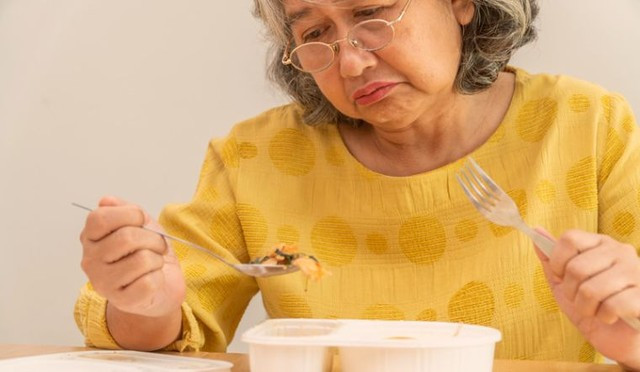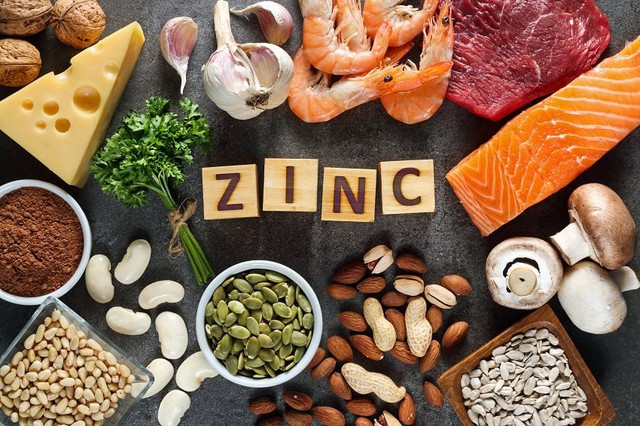Eating foods rich in zinc is a good solution for zinc deficiency, especially for the elderly who often have poorer nutrition.

Zinc is an essential mineral found in many foods. Deficiency in this mineral can cause a number of health effects, such as reduced immune function, memory loss, loss of appetite, malabsorption, etc.
Zinc is a mineral that plays an important role in many functions in the body. Zinc helps slow down the oxidation process, helping to prevent many diseases, especially cardiovascular diseases. Zinc is an essential element in neurotransmission, helping the elderly's brain to be clear, increase concentration, enhance memory, sleep well and sleep deeply.
Besides calcium, zinc is also an essential element for the formation and development of bones and joints. Zinc plays an important role in the growth and development of cells, as well as the renewal of collagen in cartilage, so it has the effect of preventing osteoporosis and degenerative joint diseases in the elderly.
Zinc is also essential for the transport of vitamin A into the retina, helping to prevent eye diseases and vision loss due to aging. In addition, zinc also helps prevent eye diseases such as retinal edema, retinal opacity, and macular degeneration in the elderly.
Studies have shown that low zinc levels can threaten the immune system. Our bodies do not synthesize zinc on their own, but mainly absorb it from daily foods through the digestive system. Meanwhile, the digestive system in the elderly no longer functions as well as before, along with some aging diseases leading to loss of appetite, poor eating, leading to zinc deficiency.
Dr. Nguyen Trong Hung - National Institute of Nutrition said that the immune system in the elderly is often weakened, has low resistance, is susceptible to infections, respiratory diseases, autoimmune diseases and other chronic diseases... When the immune system is weakened, if you get sick, it will take longer to recover. Therefore, to improve the immune system and reduce the risk of disease, the elderly need to supplement zinc.
Impaired immune function increases susceptibility to pneumonia and influenza, and also increases the risk of developing autoimmune diseases and cancer. Maintaining adequate zinc levels may limit the decline in immune function that often occurs with age. Research shows that, for older adults, maintaining adequate zinc status is important in preventing pneumonia, especially during the winter. For older adults, infectious diseases, such as pneumonia, are often fatal. In a study of older adults in nursing homes, those with normal serum zinc levels had lower rates of pneumonia and were prescribed half as many antibiotics as those with low serum zinc levels.
Studies involving older adults who supplemented with zinc have shown that improved zinc status improves immune function and resistance to infection. In a 2007 study, adults aged 55–87 had lower plasma zinc levels and higher markers of inflammation and oxidative stress than younger adults. Half of the older adults took zinc supplements for 12 months, and the other half took a placebo. Rates of respiratory infections and markers of inflammation and oxidative stress were lower in the zinc group than in the placebo group.

Older adults need to maintain healthy immunity through a diet rich in phytochemicals and essential nutrients. Healthy eating reduces the risk of respiratory illness because many micronutrients support proper immune function.
Zinc does not exist in the body in reserve form so it must be regularly supplemented daily. Meanwhile, the elderly have weakened immune systems and often diet, so they are at high risk of zinc deficiency.
Zinc is found in a wide range of foods. A healthy, balanced diet that includes zinc-rich foods should meet everyone’s needs. For those who do not eat an optimal diet to boost their immune function, immunity begins to decline between the ages of 60 and 65. But even those who eat a proper diet may need zinc supplements. Zinc needs are estimated to be about 50% higher for those who eat a completely plant-based diet due to reduced bioavailability from plant foods.
Phytate — an antioxidant compound found in whole grains, legumes, nuts and seeds — blocks the absorption of certain minerals, including zinc.
Additionally, other minerals such as iron and calcium interfere with zinc absorption. Copper also competes with zinc to bind to proteins inside the body's cells.
According to Dr. Nguyen Trong Hung, the elderly should not be vegetarians or abstain from foods that can lead to zinc deficiency. To supplement zinc for the body, the elderly should eat foods rich in zinc from both animal and plant sources. The elderly can rest assured that they will not have excess zinc through their daily diet.
Zinc-rich foods that the elderly should eat every day:
- Beef, lean pork, and lamb provide a lot of zinc. 100g of raw ground beef contains 4.8mg of zinc, accounting for 44% of daily needs. Elderly people should consume moderate amounts of red meat along with a diet rich in fruits, vegetables, and fiber.
- Shellfish are a low-calorie and healthy source of zinc. Shellfish such as oysters, clams, snails, mussels, clams, crabs, shrimp... Oysters contain an especially high amount of zinc, just 1 medium-sized oyster provides up to 5.3mg of zinc, equivalent to 48.5% of daily needs.
- Eggs also contain a moderate amount of zinc. One large egg contains about 5% of the daily zinc requirement.

- Milk and dairy foods such as cheese and yogurt are highly bioavailable sources of zinc, meaning that the zinc in these foods is more readily absorbed by the body. For example, a cup of whole milk contains about 9% of the daily zinc requirement. 100g of cheddar cheese provides about 28% of the zinc requirement.
- Some colorful vegetables, fruits and other plant foods are rich in phytochemicals that also have antibacterial and immune-boosting effects in addition to zinc.
- Nuts and seeds such as peanuts, cashews and almonds also contain significant amounts of zinc and other healthy nutrients, including healthy fats and fiber.
- Legumes such as green beans and lentils contain a significant amount of zinc. 100g of cooked lentils contain about 12% of the daily zinc requirement. However, beans also contain phytates that inhibit the absorption of zinc and other minerals, which means that zinc from beans is not absorbed as well as zinc from animal products. If supplemented through daily food, the elderly will not be at risk of excess zinc, but if supplemented through food preparations (in the form of drinks, functional foods), advice and prescription from a doctor is required.
HA (according to Health and Life)